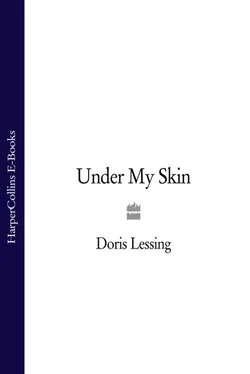DORIS LESSING

Under My Skin
Volume One of
My Autobiography, to 1949

Cover
Title Page DORIS LESSING Under My Skin Volume One of My Autobiography, to 1949
1
2
3
4
5
6
7
8
9
10
11
12
13
14
15
16
17
18
19
20
21
A Note on Population
Glossary
Acknowledgements
Praise
Also by the Author
About the Author
Copyright
About the Publishers
I’ve got you under my skin
I’ve got you deep in the heart of me
So deep in my heart you’re really a part of me,
I’ve got you under my skin.
I’ve tried so not to give in …
COLE PORTER
The individual, and groupings of people, have to learn that they cannot reform society in reality, nor deal with others as reasonable people, unless the individual has learned to locate and allow for the various patterns of coercive institutions, formal and also informal, which rule him. No matter what his reason says, he will always relapse into obedience to the coercive agency while its pattern is within him.
IDRIES SHAH, Caravan of Dreams
No matter where one looks on the face of the earth, wherever there are people, they can be observed syncing when music is played. There is popular misconception about music. Because there is a beat to music, the generally accepted belief is that the rhythm originates in the music, not that music is a highly specialized release of rhythms already in the individual. Otherwise how can one explain the close fit between ethnicity and music?
Rhythm patterns may turn out to be one of the most basic personality traits that differentiates one individual from another.
… when people converse … their brain waves even lock into a single unified sequence. When we talk to each other our central nervous systems mesh like two gears in a transmission.
The power of rhythmic message within the group is as strong as anything I know. It is … a hidden force, like gravity, that holds groups together.
I can remember being quite overwhelmed when I first made cinematographic recordings of groups of people in public. Not only were small groups in sync, but there were times when it seemed that all were part of a larger rhythm.
EDWARD T. HALL, The Dance of Life
‘SHE WAS VERY PRETTY but all she cared about was horses and dancing.’
This refrain tinkled through my mother’s tales of her childhood, and it was years before it occurred to me, ‘Wait a minute, that’s her mother she’s talking about.’ She never used any other words than those, and they could not have been her words, since she did not remember her mother. No, this was what she had heard from the servants, for she unconsciously put on a kitchen face, with a condemning look about her mouth, and she always gave a disapproving sniff. That little sniff evoked for me a downstairs world as exotic as the people in it would have found tales of cannibals and the heathen. Servants and nursemaids brought the little children up, after the frivolous Emily McVeagh died, in childbed, of peritonitis, with her third, when her first, my mother, was still only three. There is not even a photograph of Emily. She is Nobody. She is nothing at all. John William McVeagh would not talk about his first wife. What can she have done? – I asked myself. After all, to be light-minded is not a crime. At last it came to me. Emily Flower was common, that must have been it.
Then a researcher was invited to throw light into those distant places and she came up with a mass of material that would do very well as a basis for one of those Victorian novels, by Trollope perhaps, where the chapter about Emily Flower, called ‘What Can Have Been Her Fault?’, could only be a short one, if the saddest.
‘The information on the Flower family was got through birth, marriage and death certificates, parish records, census records, apprentice records, barge owners’ records, lightermen and watermen records, local history and wills,’ says the researcher, evoking Dickens’ England in a sentence.
There was a Henry Flower who in 1827 was described as Manner, and in the 1851 census as a Victualler. He was born in Somerset and his wife Eleanor was born in Limehouse. Their son, George James Flower, delinquent Emily’s father, was apprenticed to a John Flower, presumably a relative. The Flower family were barge owners, and on Emily’s birth certificate her father was described as lighterman.
The Flower clan lived in and around Flower Terrace, now demolished, and George James and his wife Eliza Miller lived at Number 3 Flower Terrace. This was in Poplar, near what is now Canary Wharf. There were four children. Eliza was widowed, aged thirty-five, and the closeness and mutual helpfulness of the clan is shown by how, although women did not do this then, the lightermen and watermen allowed her to be a barge owner and take apprentices. She made her son Edward an apprentice and he later became lighterman and barge owner in her place. Her children did well, and she ended in a pleasant house, with an annuity. Emily was the youngest child and she married John William McVeagh in 1883.
My mother described the house she was brought up in as tall, narrow, cold, dark, depressing, and her father as a disciplinarian, strict, frightening, always ready with moral exhortations.
The well-off working class had a good life in late Victorian times, with jaunts to the races, all kinds of parties and celebrations. They most heartily ate and drank. Nothing dreary or cold about Flower Terrace and its companion streets, full of relatives and friends. Emily came from this warm clan life into the doubtless ardent arms of John William McVeagh – he must have been very much in love to marry her – but she was expected to match herself to his ambitions, to the frightful snobberies of a man fighting to leave the working class behind. I imagine her running back home when she could to her common family, for dances, good times and going to the races. She must have lived in her husband’s house under a cold drizzle of disapproval, from which, or so I see it, she died, aged thirty-two.
My mother never mentioned her grandfather, John William’s father, and that meant John William did not talk about him any more than he did about Emily.
‘The information for this family,’ says the researcher, ‘comes from births, deaths and marriages, the clerical directory, the Public Record Office, army records and books on the Charge of the Light Brigade, census reports, wills and local directories. John McVeagh’s date of birth and place of birth conflict in the records. Army records of birth and occupation are frequently incorrect as men enlisting, for reasons of their own, gave wrong information, and it would have been difficult to check up in the pre-1837 registration time. In any case, recruiting stations were not particular in the army of the nineteenth century.’
John McVeagh was born in Portugal, and his father was a soldier. He was in the 4th Light Dragoons, and was a Hospital Sergeant Major when he left the army in 1861. He was in the Crimea and East Turkey and in the Charge of the Light Brigade – he really was, for soldiers made that claim who had no right to it. But why did they want to have been part of such carnage? John McVeagh’s conduct as a soldier was exemplary. When his horse was shot under him in the Charge he continued to tend the wounded though wounded himself. He received various medals. Here is an entry for March 1st 1862, the United Service Gazette:
Читать дальше













